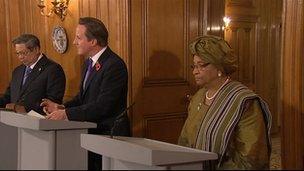World has chance to end extreme poverty for good - Cameron
- Published
- comments

Mr Cameron said all countries had an obligation to contribute to the global fight against poverty
David Cameron has said there is a "real opportunity" to end extreme global poverty within the next few decades.
The prime minister said politicians had been talking about the goal for years but "this generation" had a chance of fulfilling the long-held ambition.
He was speaking after hosting a meeting of politicians from around the world to discuss anti-poverty strategies.
Mr Cameron has been asked by the UN to look into how poverty in developing countries should be tackled after 2015.
On Thursday, he co-chaired the first meeting of the United Nations panel, along with Liberian President Ellen Johnson Sirleaf and the Indonesian president Susilo Bambang Yudhoyono.
'Great progress'
After the meeting, attended by 26 countries, Mr Cameron said "great progress" had been made since the launch of the Millennium Development Goals in the late 1990s but the international community must aspire to do even more.
All countries had obligations to do their bit to help meet the anti-poverty targets, he added - citing the need for the UK and other wealthier countries to be transparent about how their aid budget are spent.
"The principle aim of the panel should be finishing the job of ending extreme poverty...That is something that politicians have been talking about for a while but for the first time I think this generation really has the opportunity to do it."
The Millennium Development Goals, set to be completed by 2015, are pledges by UN member countries to increase living standards in poorer parts of the world.
The first of them - reducing poverty among some of the very poorest - has been achieved, due largely to big increases in income in recent years in China and India. But attempts to reach other goals have been less successful.
Mr Cameron said there needed to be a renewed focus on tackling the causes of poverty - highlighting the importance of reducing corruption, promoting the rights of women and minorities and backing freedom of expression and association.
The panel will meet again in Monrovia and Jakarta next year, before reporting to the UN Secretary-General Ban Ki Moon.
Most of the other attendees of the London gathering are ministers from foreign governments or heads of economic committees.
The Indonesian president, who is on a three-day state visit to Britain, said the UN panel had a "common vision" over how to respond to the challenges facing the developed and developing world.
"I believe that poverty eradication can only be achieved by raising the living standards of the poor around the world.
"This can be done by creating job opportunities and providing accessible and affordable health services, education facilities, housing, clean water and sanitation."
BBC international development correspondent David Loyn said that in finding a successor for the Millennium Development Goals, China and some African countries will want to stop what they see as further interference into governance.
But the big donor nations in the West will need guarantees of transparency and better accountability for governments who receive aid, if aid is to continue, our correspondent added.
- Published31 October 2012
- Published17 October 2012
- Published17 October 2012